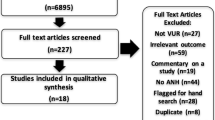Abstract
The purpose of this study was to make evidence-based recommendations regarding the mode, dosage and schedule of delivery of concomitant mesna (sodium-2-mercaptoethanesulfonate) to protect against ifosfamide-induced uroepithelial toxicity. A critical review of the literature from 1966 to 1996 was undertaken on mesna administration via the intravenous, oral, or combined modality routes. Outcome measures of urinary symptoms and macrohematuria were emphasized, since these end-points of urotoxicity are most clinically relevant. The quality of evidence obtained from published clinical research was evaluated based on guidelines developed by the Canadian Task Force on the Periodic Health Examination. Recommendations are now made according to the strength of available evidence on the proper usage of mesna as a protective agent against ifosfamide-induced urotoxicity. There is good evidence that the use of mesna significantly reduces urinary symptoms of dysuria and frequency, as well as the incidences of macrohematuria and microhematuria, when administered concurrently with any dosage of ifosfamide regardless of tumor site. Mesna, given intravenously or orally, is superior to standard prophylaxis with vigorous hydration and alkalinization of urine. A commonly used schedule of intravenous mesna involves a dose equal to 60% of the total ifosfamide dose, divided into three aliquots and administered at 0 h, 4 h and 8 h after ifosfamide. Combined oral and intravenous mesna delivered in some tested schedules is equivalent to intravenous mesna alone, but the optimal schedule and dosage of combined formulation have not yet been established. There is fair indirect but no direct evidence that oral mesna alone is equivalent to intravenous mesna or combined modality use. Further research issues, such as patient compliance with oral mesna and other routes of mesna delivery, are discussed. Ongoing study in the appropriate use of mesna is needed to maximize its value as a uroprotective agent in the clinical setting.
Similar content being viewed by others
Author information
Authors and Affiliations
Rights and permissions
About this article
Cite this article
Siu, L., Moore, M. Use of mesna to prevent ifosfamide-induced urotoxicity. Support Care Cancer 6, 144–154 (1998). https://doi.org/10.1007/s005200050149
Published:
Issue Date:
DOI: https://doi.org/10.1007/s005200050149




